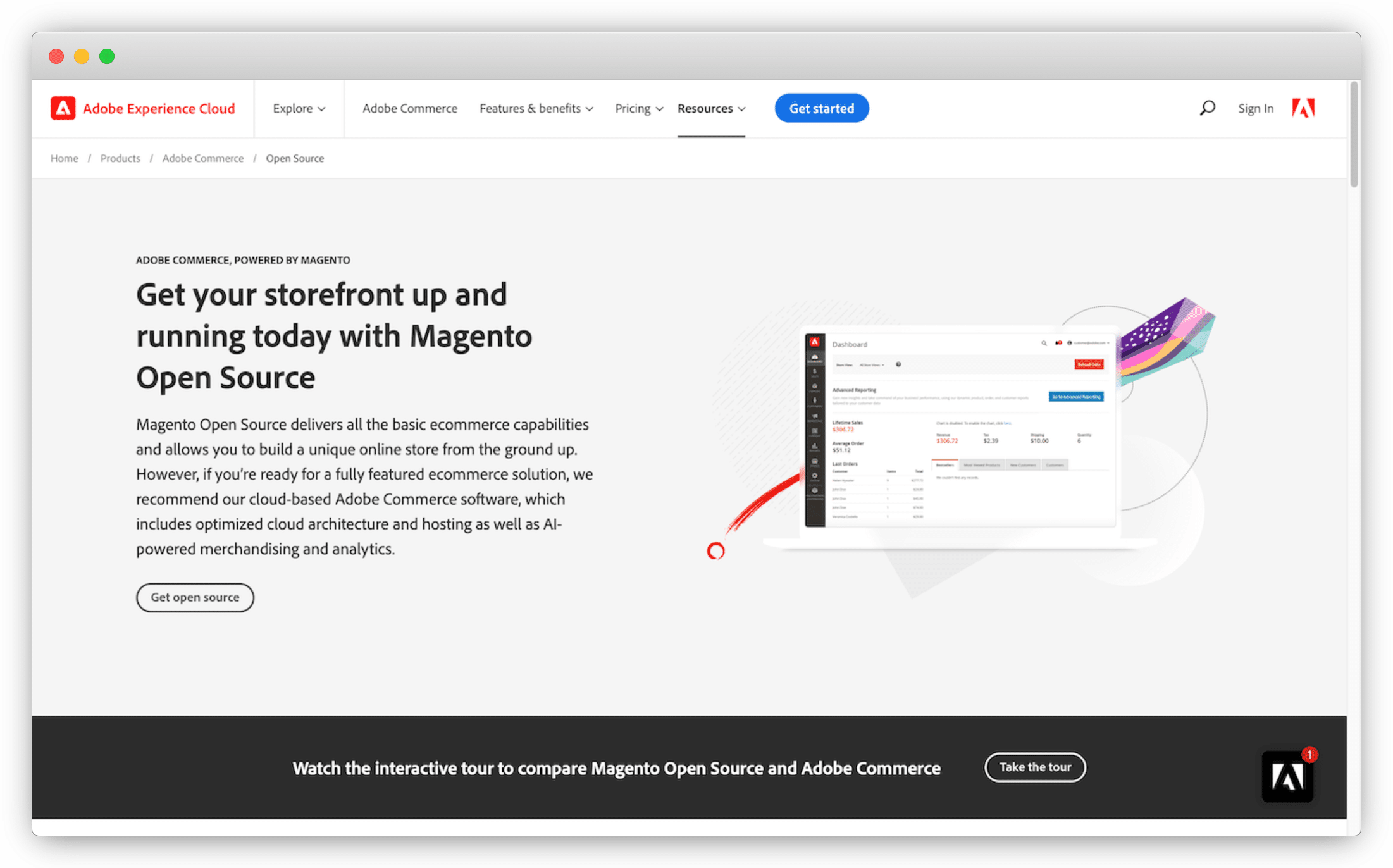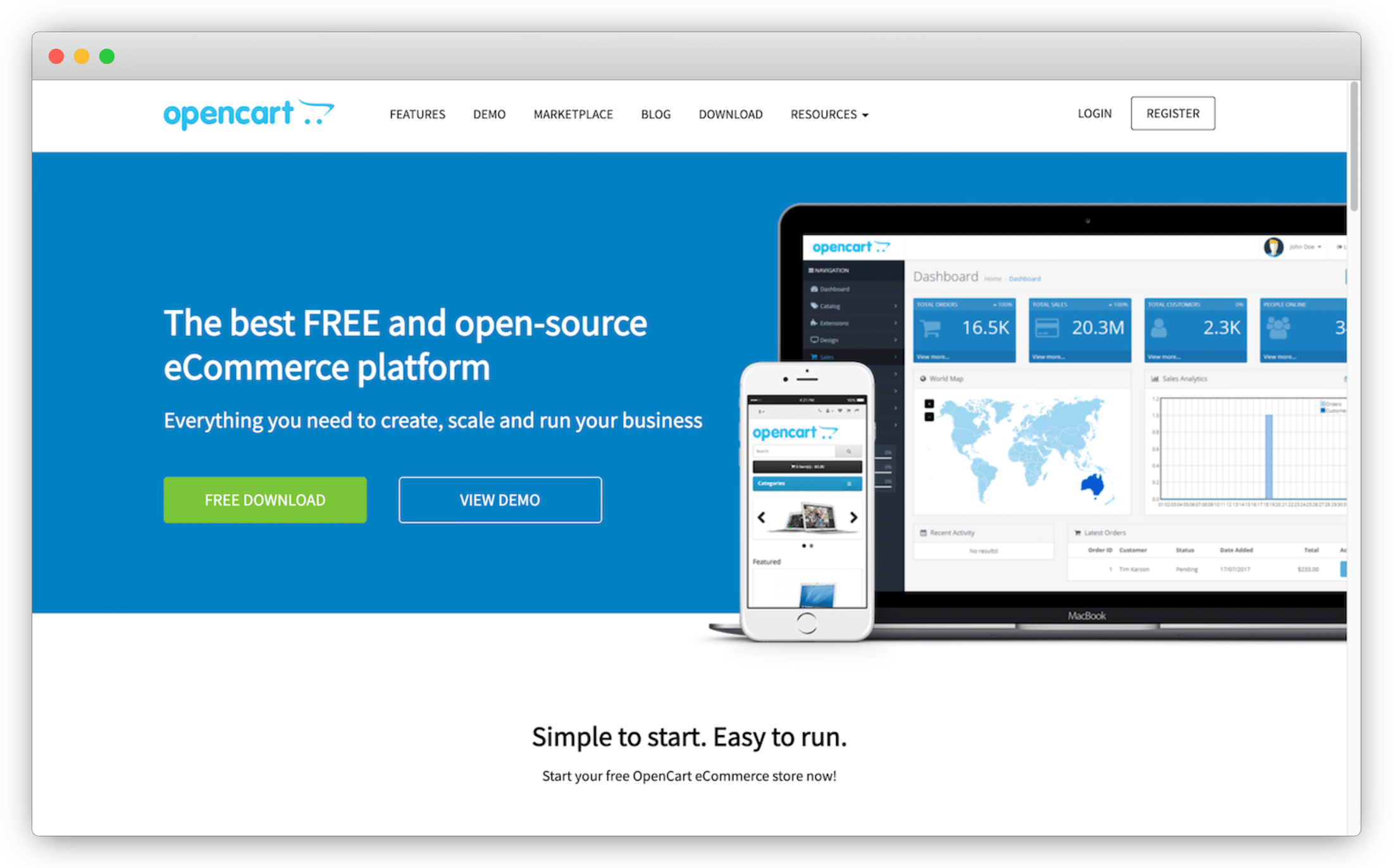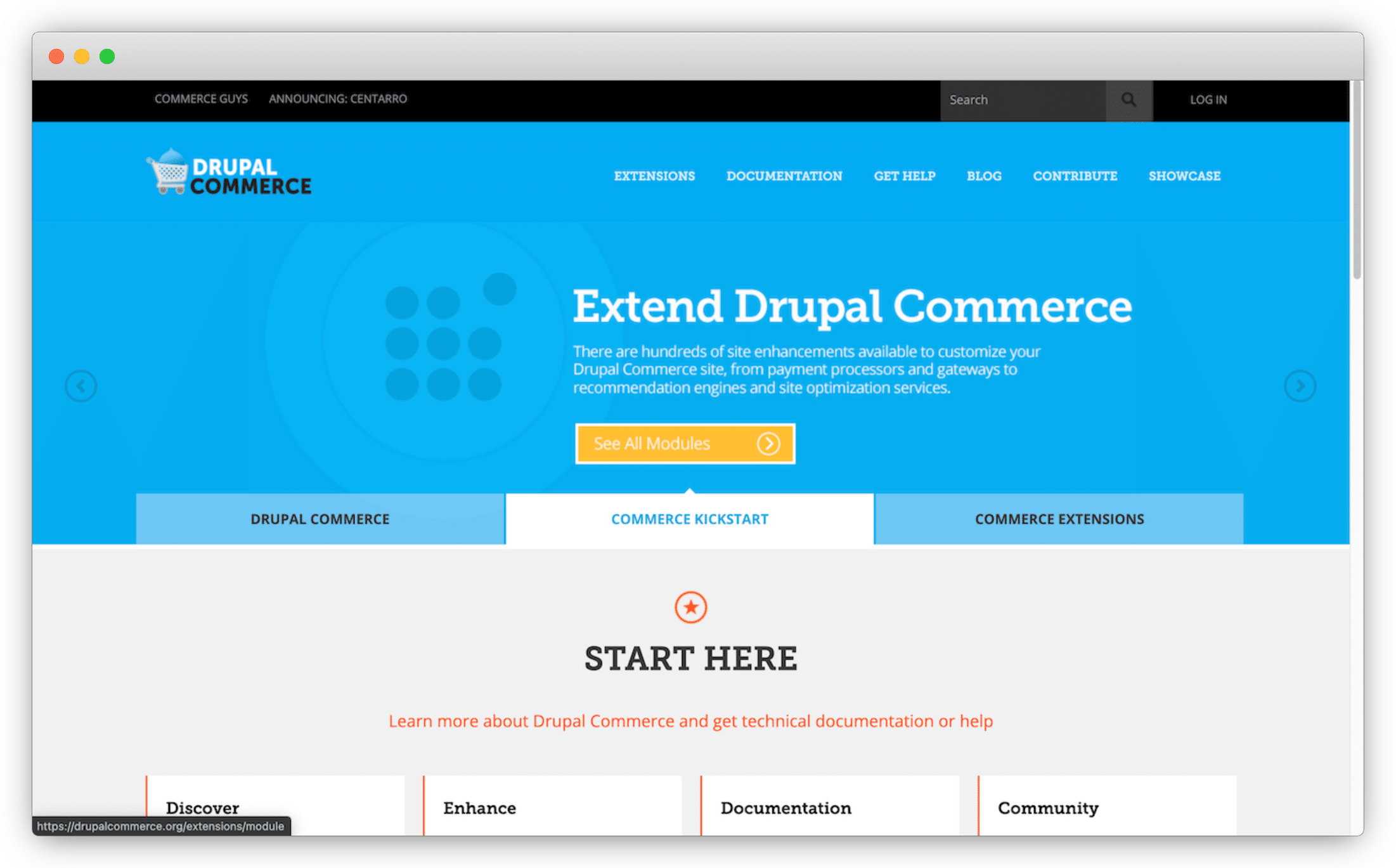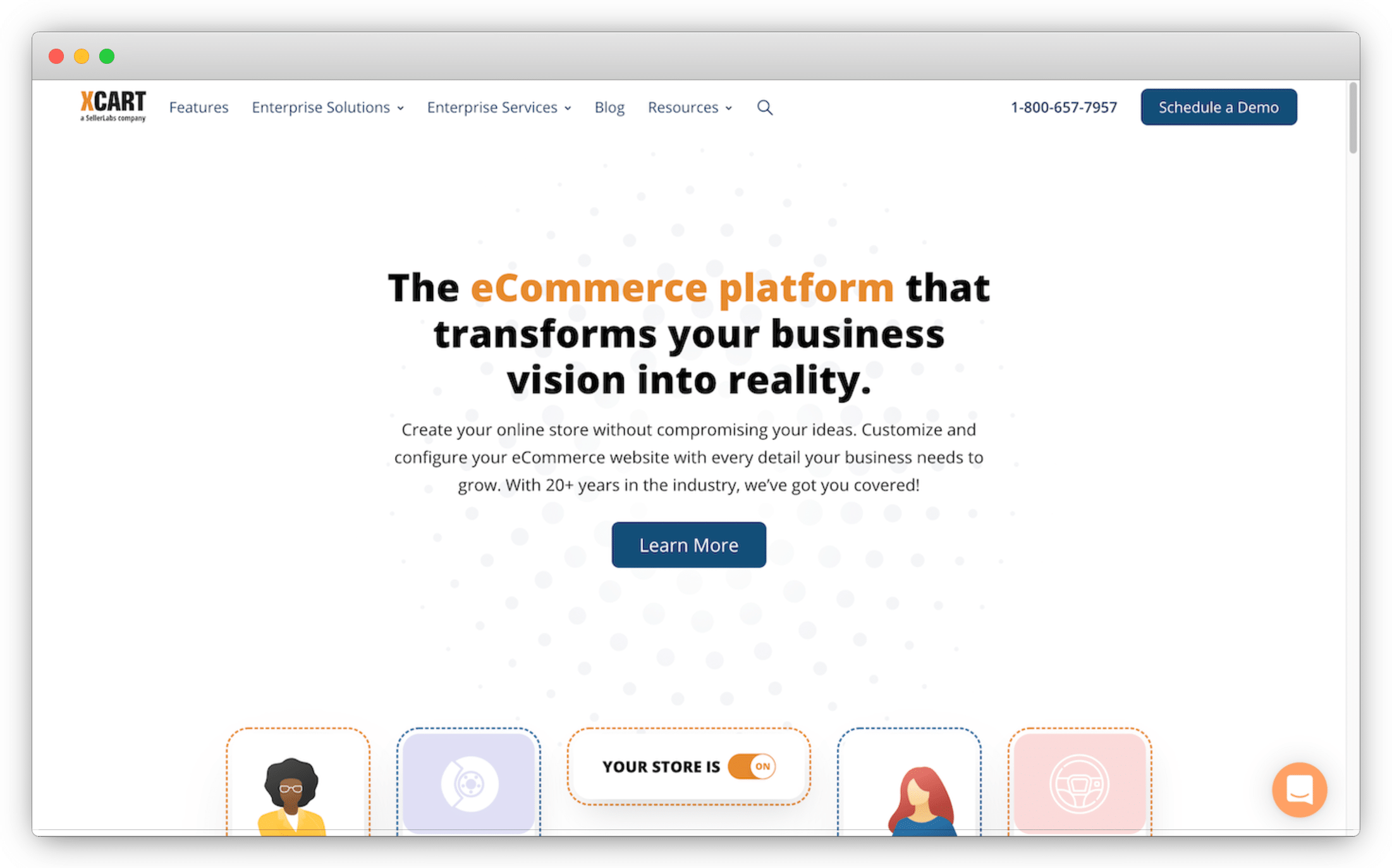What Are the Top Open Source B2B E-Commerce Platforms in 2023?

Most B2B e-commerce brands leverage open source e-commerce platforms to build robust, stable, and scalable infrastructure that lets customers enjoy an unparalleled online shopping experience.
The top B2B open source e-commerce platforms have database management, technical expertise, stability, and are scalable and flexible.
The top B2B open source e-commerce platforms include Magento 2, OpenCart, Drupal Commerce, X-Cart, and PrestaShop.
fabric couples the simplicity of the drag-and-drop configuration with the power to create modern, rich customer experiences without the need for a large development team—just like open source software.
Open source software (OSS) is computer software released under a license that grants anyone the right to use, edit, and distribute the software and its source code to anyone for any purpose. Open source components make up 60% to 80% of the code base of modern applications.
B2B brands rely on open source software because it offers them the security, flexibility, and scalability they need to deliver an excellent experience to their customers. For example, 33% of B2B companies say they like open source software because it’s better quality and 29% say it offers better security. That said, software-as-a-service (SaaS) is still a viable option when investigating B2B e-commerce platforms.
[toc-embed headline=”Open Source Vs SaaS E-Commerce Platforms”]
Open Source Vs SaaS E-Commerce Platforms
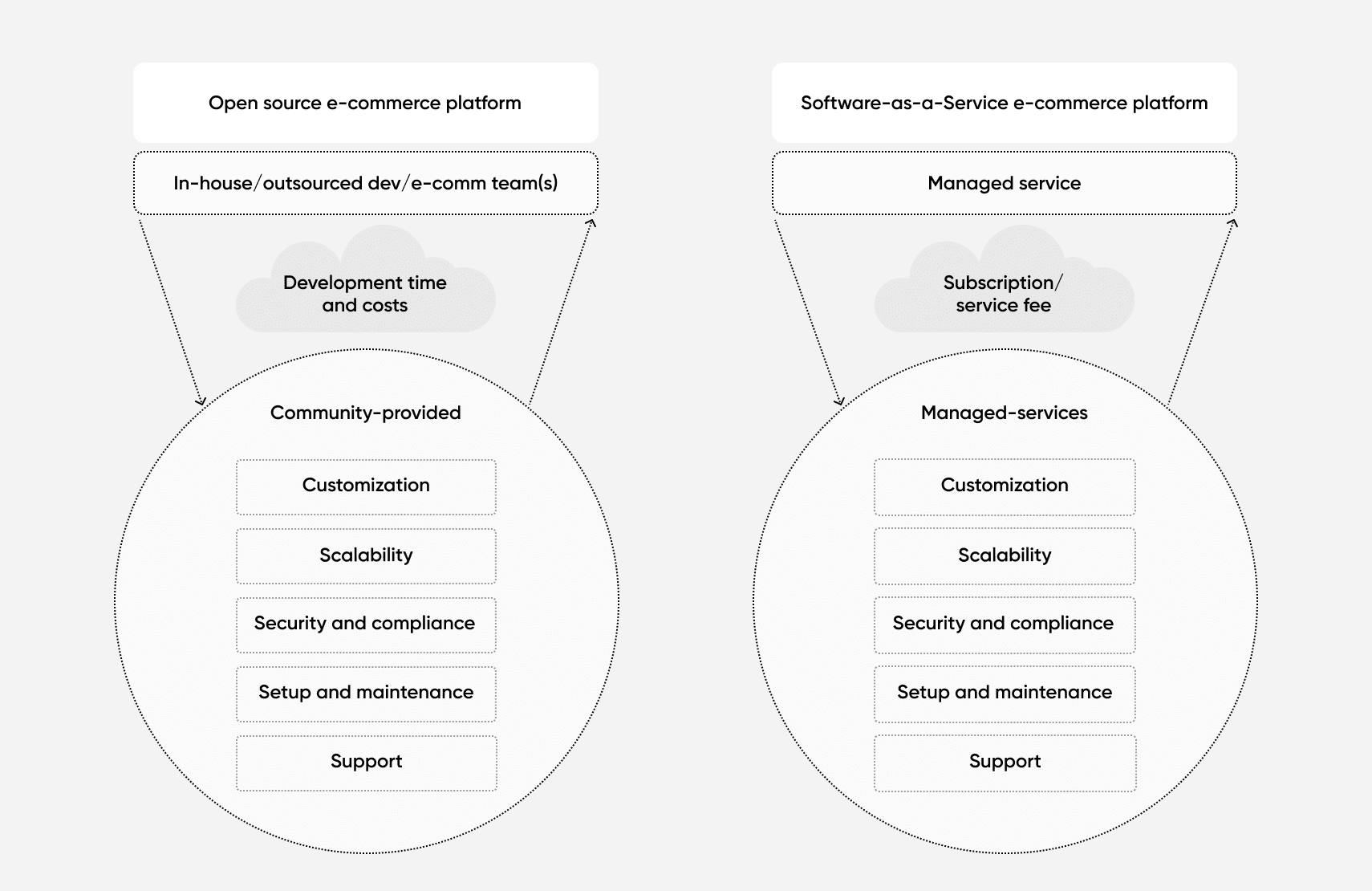
Software as a service (SaaS) is a software licensing and delivery model in which software is licensed on a subscription basis. On the other hand, open source software allows users to view, modify and distribute their source code for their own use.
The main takeaway is that open source options give you complete control but require more resources to configure and maintain. SaaS options take care of these requirements for you while still giving you the ability to create robust back-end systems and unique front-end shopping experiences. SaaS platforms like fabric offer you the flexibility of OSS but without the hassle of infrastructure and maintenance.
[toc-embed headline=”Features of Open Source B2B E-Commerce Platforms”]
Features of Open Source B2B E-Commerce Platforms
Here is a summary of some of the standard features to expect from the top B2B open e-commerce platforms.
Database management
More than a third of the world’s hacking occurs in the e-commerce sector, making it the most hacked sector ahead of the banking sector, accounting for over 25%. That implies that B2B e-commerce platforms should provide the highest level of security possible to protect both their customers and their customers’ customers.
Open source B2B e-commerce platforms allows B2B companies to enjoy the level of security they need to be safe from hackers. By allowing “many eyes” to examine the source code, security flaws in open source products are uncovered and addressed, quickly and efficiently. It is a great advantage over closed source software, with which companies must rely on vendors’ goodwill to take security threats seriously.
Also, many open source software vendors offer security-focused versions of their products that monitor the integrity of the software distribution, check file sizes and other indicators to ensure that the code has not been modified and redistributed by malicious people.
Technical expertise
Many open source programs are created to meet the needs of the developer, regardless of usability. Hence, it takes extensive technical skills to modify open source code and make it accessible to non-technical users.
According to Statista, the top skills needed to best manage an open source project are cloud technology (41%), Linux (32%), and networking technology (31%). B2B e-commerce platform founders who lack technical skills are forced to hire specialists, which requires financial and managerial resources.
In addition, many open source e-commerce platforms require technical support. This part of maintaining a thriving open source ecosystem is often overlooked as most companies focus on adding new features and fixing bugs. Technical support is crucial as it handles all the technical hurdles that prevent end-users from getting the most out of their e-commerce software.
Scalability
6% of B2B buyers do not shop online. This means that B2B e-commerce platforms need to ensure that their infrastructure can support and satisfy buyer spikes and peak demand periods. And this is where open source B2B e-commerce platforms come in handy.
An open source B2B e-commerce platform allows companies to scale from startup to blue chip without going through the hassle of rewriting and repurposing their code. That’s because the source code is already available, and the licenses generally allow modification as needed. Consequently, B2B e-commerce platforms are able to save big on software development costs.
Most B2B open source platforms are optimized to balance a server’s workload among many machines working in tandem. In addition, the source code is constantly being improved by contributors, which means that most open source B2B e-commerce platforms do not suffer from obsolescence and are almost always up to date.
Another factor that makes B2B platforms use OSS is that the individuals who develop open source software are frequently the same people who will use it in the future, so it is more likely that these platforms meet the demands of the end-user.
Flexibility
According to the Linux Foundation, “Open source software offers the greatest flexibility of any third-party software alternative.” It spans operating systems and databases and works anywhere, whether in the cloud or on-premises data center, and can adapt to whatever your needs are.
Open source B2B e-commerce platforms also offers excellent control over the shopping experience, as powerful features can be created by overwriting the source code, making them ideal for companies with particular needs.
For example, many fashion e-commerce companies want to offer advanced technologies such as virtual fitting rooms, making open source platforms an attractive option. The only limit to what a B2B e-commerce platform can do with open source software is the developers’ imagination and budget.
Another advantage of open source platforms is that there is no vendor lock-in, which means less freedom for developers to decide what tools to use and where to deploy their applications.
In a context where most B2B e-commerce platforms are fueled by the joint force of software integrations, open source e-commerce platforms are the ideal solution for any e-commerce that wants to run on today’s consumer standards.
Stability
According to a study by Statista, the volume of B2B e-commerce in the United States in 2021 is $6.7 trillion, more than double the $3.2 trillion recorded in 2012. In other words, seller-buyer interactions in the B2B sector are increasing at a dizzying pace, and most B2B e-commerce platforms need to make their infrastructure stable before they can keep up with the trend.
Open source allows B2B platforms to have this stability by making the source code publicly available. Users can then rely on it for their long-term projects without fearing that the creators of the code will abandon the project or let it fall into disuse. Also, it offers open APIs that allow integrations with any future system—since new APIs can be quickly published, connected, and exchanged seamlessly.
Another factor that speaks to open source’s stability is that the Internet’s core functions are built on open source technologies. For example, the Linux operating system governs the operation of Web servers, and the Apache Web server application negotiates the transfer of data between the global server infrastructure and personal devices.
According to PIMCore, the quality of popular open source products outperforms that of proprietary commercial products.
[toc-embed headline=”Top Five Open Source B2B E-Commerce Platforms”]
Top Five Open Source B2B E-Commerce Platforms
There are many B2B open source e-commerce platforms, but only a few let e-commerce companies build, secure, and scale their infrastructure as needed. Below are the top five B2B open source e-commerce platforms based on stability and scalability.
Magento 2
With more than 300,000 users worldwide, Magento 2 open source edition—commonly called Community Edition—is one of the most popular open source platforms for B2B e-commerce companies. Since its first public beta version in 2007, Magento 2 has grown from a basic e-commerce platform to an open source infrastructure that holds more than 30% of the total open source e-commerce platform market share.
Magento 2 allows B2B e-commerce brands to scale their platform as their business grows. This makes it easier to grow from a small vendor with a limited product line to an enterprise e-commerce brand with thousands of products at once.
Magento 2 is optimized to integrate with most modern e-commerce software, which means you can easily extend its functionality through third-party software such as enterprise resource planning (ERP), product information management (PIM), or CRM.
OpenCart
With over 600,000 users, OpenCart comes as one of the best open source e-commerce platforms out there. Many prefer it as a simpler alternative to Magento. Case in point, it has 300 000 more users than the latter. OpenCart is more suitable for small and medium-sized businesses that are just starting out in the e-commerce game.
OpenCart has an easy-to-use admin dashboard that lets B2B commerce platforms manage products, promotions, orders, and reports without worrying about technical expertise.
The platform also offers an impressive 13,000 extensions, making it easy for B2B e-commerce platforms to add additional functionalities to their online store and keep pace with growing demand.
OpenCart offers its users two types of support: a community forum that allows users to share their knowledge and experience in running an online business and a paid support service for a monthly fee of $99.
Drupal Commerce
Released on January 15, 2001, Drupal Commerce is one of the most robust open source systems available for e-commerce businesses. The Drupal Commerce open source project supports multilingual development with multi-currency support, and its features make it perfect for B2B e-commerce platforms that experience a lot of traffic.
Drupal integrates with a wide range of third-party applications and allows the user to leverage many applications internal to the ecosystem, including the Drupal content management system.
Drupal Commerce offers documentation guides for merchants, developers, and site builders. The Drupal Commerce website also features a Q&A forum for users, as well as a video library.
X-Cart
Founded in 2000, X-Cart is a reliable open source PHP solution that provides lifetime licenses to customers. It is an excellent B2B e-commerce platform for SMBs that want to scale faster and easier with a fairly low budget.
B2B companies can choose between two versions of X-Cart: X-cart 4 and X-cart 5. While both versions are excellent in terms of scalability and other general e-commerce features, X-cart 5 is better with more out-of-the-box features, plugins, and better mobile usability.
X-Cart requires a lot of coding and extensive use of HTML, so companies with in-house programmers have the flexibility to customize and iterate the source code as needed. This also leaves a lot of room for security and scalability.
PrestaShop
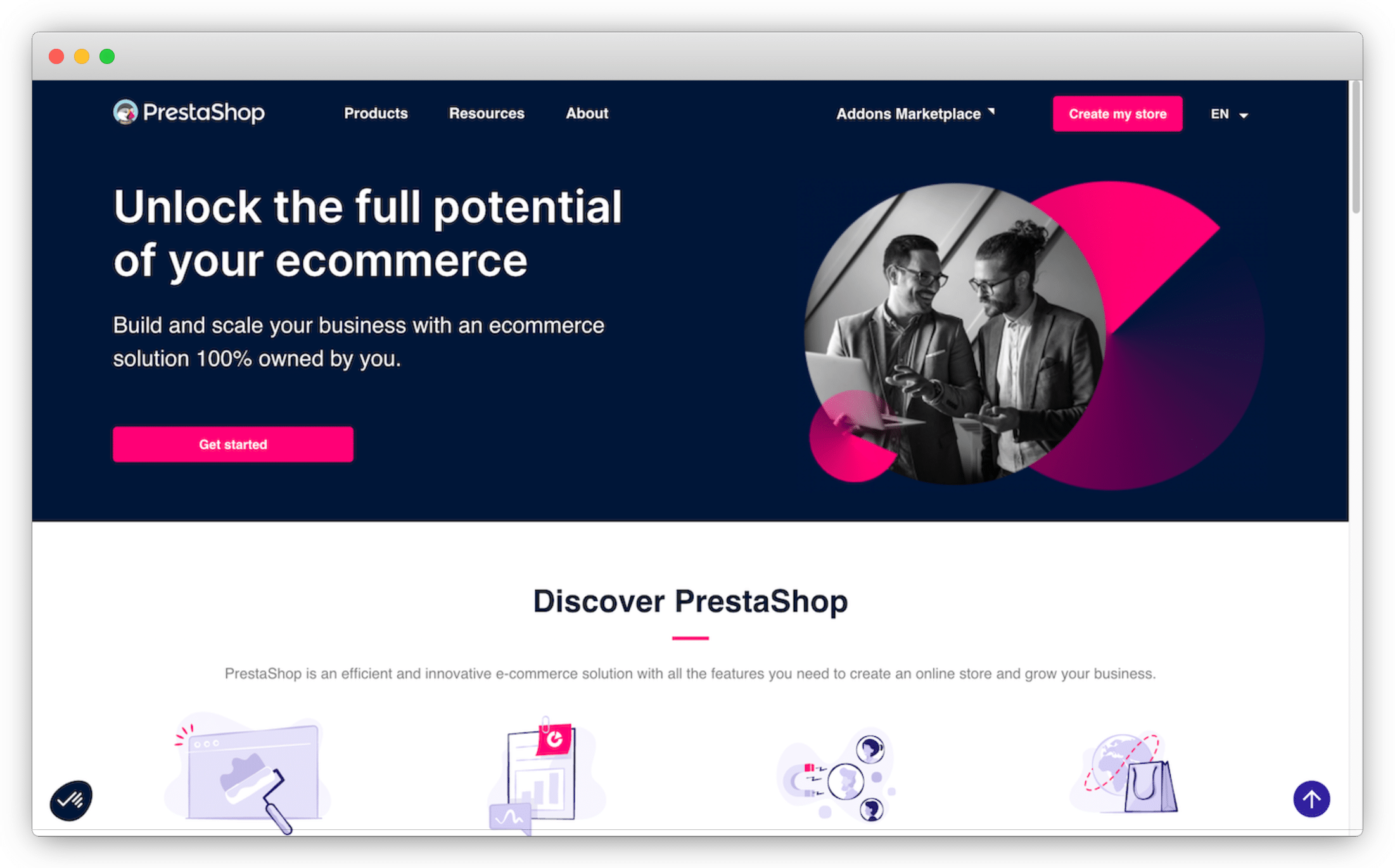
With over active 300,000 users, PrestaShop is one of the most popular open source e-commerce platforms in Europe and Latin America. It runs on the robust Symfony framework and includes more than 600 features that B2B e-commerce brands can use to manage their online store, product catalog, and multi-store setup.
In addition, PrestaShop has over 3,000 add-ons that allow retailers and wholesalers to customize their store, increase organic traffic, improve conversion rates while building customer loyalty. In addition, PrestaShop is also available in over 65 languages and multiple currencies.

Content marketer @ fabric. Previously marketing @ KHON-TV and Paramount Pictures.
